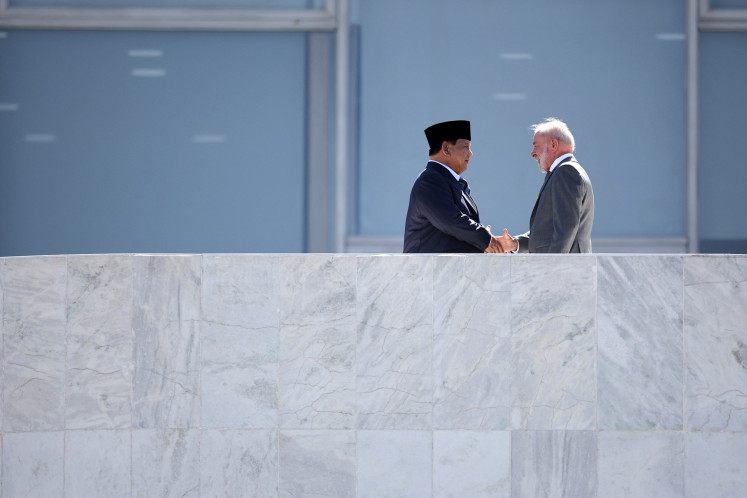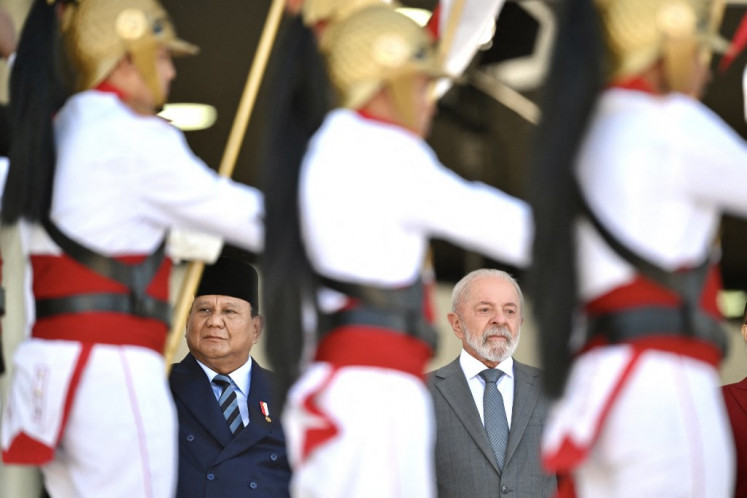Popular Reads
Top Results
Can't find what you're looking for?
View all search resultsPopular Reads
Top Results
Can't find what you're looking for?
View all search results`The Peacock' flies to eternity
When on stage, renowned poet and playwright WS Rendra sought to be noticed and to charm the crowd with his charisma
Change text size
Gift Premium Articles
to Anyone
When on stage, renowned poet and playwright WS Rendra sought to be noticed and to charm the crowd with his charisma.
But as sickness drained his life away, Rendra shut himself away from the public eye, asking his family not to disclose details of his condition to the press. According to friends, Rendra was so determined to have no "noise" that he even refused visits from them.
When he passed away, however, this silence was broken as condolences and respects poured in from friends and admirers.
"The Peacock", as he was known, died at Mitra Keluarga Depok hospital, West Java, at around 10 p.m. on Aug. 6, due to heart and kidney complications. He was 74. Rendra had previously been in care at Pondok Indah hospital, Harapan Kita hospital and Mitra Keluarga Kelapa Gading hospital for almost a month.
Soon after news broke of his death, people began to express their condolences, including through Facebook.
Politician Yenny Wahid was among those who expressed her admiration for Rendra.
"Mas Rendra was someone phenomenal," said Yenny, the daughter of former Indonesian president Abdurrahman Wahid. "He was such a rebel who always thought in different ways."
"While many people condemned prostitutes, for example, mas Rendra said they were much better than criminals."
Veteran actor Deddy Mizwar was among those who had the chance to visit Rendra in Mitra Keluarga Kelapa Gading. At that time, Deddy said, Rendra could hardly breathe, but that didn't keep him from spreading the word on nationalism.
Such was the theme of his life's work, characterized by nationalistic and humanist sentiments as he always remained aware of those members of society who are victimized.
His work was filled with deep empathy for the poor and the oppressed. Rendra used his poetry to fight against corruption, abuse of power and exploitation of people.
Born in Surakarta, Central Java, on Nov. 7, 1935, Rendra was raised in a Catholic family with the full name of Willibrordus Surendra Broto Rendra. He inherited his love for art and literature from his parents.
His father Raden Cyprianus Sugeng Brotoatmodjo was a traditional actor and an Indonesian and Javanese language teacher; his mother Raden Ayu Catharina Ismadillah was a srimpi dancer at the Surakarta Palace.
He grew up in Surakarta, before going on to study English literature at Gadjah Mada University in Yogyakarta.
In 1957, he published his first collection of poetry titled Balada Orang-Orang Tercinta (Ballad of the Beloved People). He got a scholarship from the American Academy of Dramatic Arts in 1964 to study drama and dance in the United States.
After returning to Indonesia in 1967, Rendra founded a theater group called Bengkel Teater in Yogyakarta; he set up another one in Depok in 1995.
Rendra's work as a poet, actor and playwright has been recognized across the world. His works have been translated into several languages and he has received several awards, including the prestigious S.E.A. Write Award in 1996.
His personal life also attracted publicity - most notably his marriages, as Rendra had three wives.
He and his first wife, Sunarti Suwandi, whom he married in 1959, have five children.
In 1970, he married his second wife Bendoro Raden Ayu Sitoresmi Prabuningrat, a princess of Yogyakarta Royal Palace. Rendra converted to Islam, his wife's religion, and changed his Catholic name to Wahyu Sulaiman Rendra. From this marriage, he has four children.
Rendra later divorced his first two wives after marrying Ken Zuraida, with whom he had two children.
It was because of his simultaneous relationships with more than one woman that Rendra gave himself the nickname "The Peacock". One day, when Rendra was with a friend, he saw a peacock walked with two peahens.
Enthralled by what he saw, Rendra pointed at the peacock, laughing and shouting: "That's Rendra, Rendra!" Since then, Rendra has been known as "the Peacock", a moniker that also refers to his publicity-loving character.
But despite his love for publicity during his glory days, Rendra chose to remain private in his last days. Perhaps "the Peacock" just wanted to fly to eternity peacefully.
- JP/Dian Kuswandini










